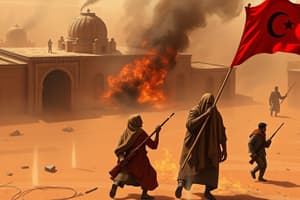Podcast
Questions and Answers
Which factor most significantly explains the shift in French public opinion against the Algerian War?
Which factor most significantly explains the shift in French public opinion against the Algerian War?
- Detailed accounts of the war's brutality and human rights violations. (correct)
- The increasing political power of anti-colonial movements within France.
- Growing international pressure and condemnation of France's actions.
- The economic burden of maintaining the colonial presence in Algeria.
How did the FLN's strategy of armed resistance impact the Algerian struggle for independence?
How did the FLN's strategy of armed resistance impact the Algerian struggle for independence?
- It weakened the Algerian resistance movement due to significant casualties and internal divisions.
- It prolonged the conflict but ultimately demonstrated the Algerian people's determination for self-determination. (correct)
- It prompted the French government to grant Algeria limited autonomy within the French Union.
- It led to immediate negotiations and a peaceful resolution with the French government.
What critical issue did the Évian Accords address concerning French citizens residing in Algeria?
What critical issue did the Évian Accords address concerning French citizens residing in Algeria?
- Guaranteed integration of French settlers into the newly independent Algerian government.
- Ensured preferential treatment for French businesses operating in Algeria.
- Mandated immediate and unconditional repatriation of all French citizens to France.
- Addressed the legal status, rights, and protections for French citizens remaining in Algeria after independence. (correct)
Which of the following best describes the immediate challenges faced by Algeria post-independence?
Which of the following best describes the immediate challenges faced by Algeria post-independence?
What distinguished the Algerian War of Independence from other anti-colonial movements in Africa?
What distinguished the Algerian War of Independence from other anti-colonial movements in Africa?
How did the actions of the FLN contribute to the eventual independence of Algeria?
How did the actions of the FLN contribute to the eventual independence of Algeria?
What was the main objective of the National Liberation Front (FLN) when it was formed in 1954?
What was the main objective of the National Liberation Front (FLN) when it was formed in 1954?
What role did international pressure play in Algeria achieving independence?
What role did international pressure play in Algeria achieving independence?
Flashcards
French Colonial Rule
French Colonial Rule
Period when Algeria was under French control for over a century, marked by exploitation and oppression.
National Liberation Front (FLN)
National Liberation Front (FLN)
The political and military group that led the Algerian struggle for independence starting in 1954.
Guerrilla Warfare
Guerrilla Warfare
A military strategy used by the FLN involving hit-and-run tactics against a larger foe.
Battle of Algiers
Battle of Algiers
Signup and view all the flashcards
Évian Accords
Évian Accords
Signup and view all the flashcards
Post-Independence Challenges
Post-Independence Challenges
Signup and view all the flashcards
Key Figures
Key Figures
Signup and view all the flashcards
Human Rights Violations
Human Rights Violations
Signup and view all the flashcards
Study Notes
Historical Context of Algerian Independence
- Algerian people lived under French colonial rule for over a century.
- French rule involved significant economic exploitation and political oppression of Algerians.
- Resistance to French rule existed for decades, escalating in the mid-20th century.
- Various factions and movements advocated for Algerian independence and national liberation.
- These movements used diverse strategies, including armed struggle and political action.
The Algerian War of Independence (1954-1962)
- The Algerian War of Independence was a significant armed struggle for liberation from French rule.
- It began with the formation of the National Liberation Front (FLN) in 1954.
- The FLN aimed for Algerian independence through armed resistance, employing guerrilla warfare.
- The conflict involved substantial violence and casualties on both sides, with severe French repression.
- French forces utilized brutal tactics, leading to widespread human rights violations.
- The war created refugee situations within Algeria and across borders.
Key Figures and Events
- Key figures in the Algerian liberation movement included Ahmed Ben Bella, Hocine Ait Ahmed, and Ferhat Abbas.
- The Battle of Algiers exemplified the conflict's ferocity.
- International pressure against France's actions increased during the war.
- French public opinion shifted negatively as reports of the war and French actions emerged.
Negotiations and Independence
- Negotiations between the FLN and the French government resulted in the Évian Accords.
- The Évian Accords were signed in 1962, transferring power and addressing the status of French citizens in Algeria.
- The accords led to Algerian independence.
- The status of French settlers in Algeria was a significant point of contention.
- Algerian independence came at a great cost in bloodshed and suffering.
Algerian Identity and Post-Independence Challenges
- Establishing Algerian state institutions formed part of creating a new national identity.
- Algerian independence faced post-independence challenges.
- Political and social instability, economic development efforts, and establishing a unified national identity were critical concerns for the new state.
- The transition to independence brought its own set of challenges following the conflict's turmoil.
Studying That Suits You
Use AI to generate personalized quizzes and flashcards to suit your learning preferences.



